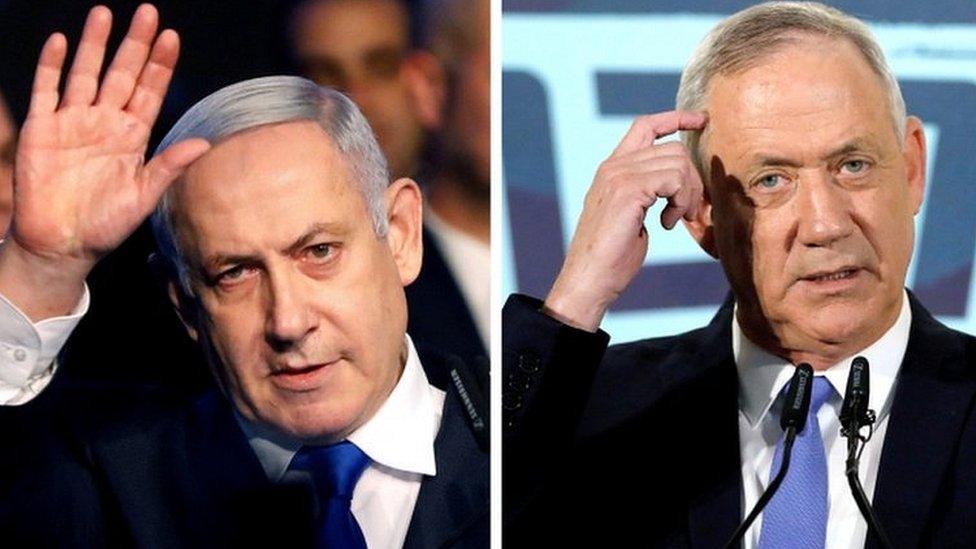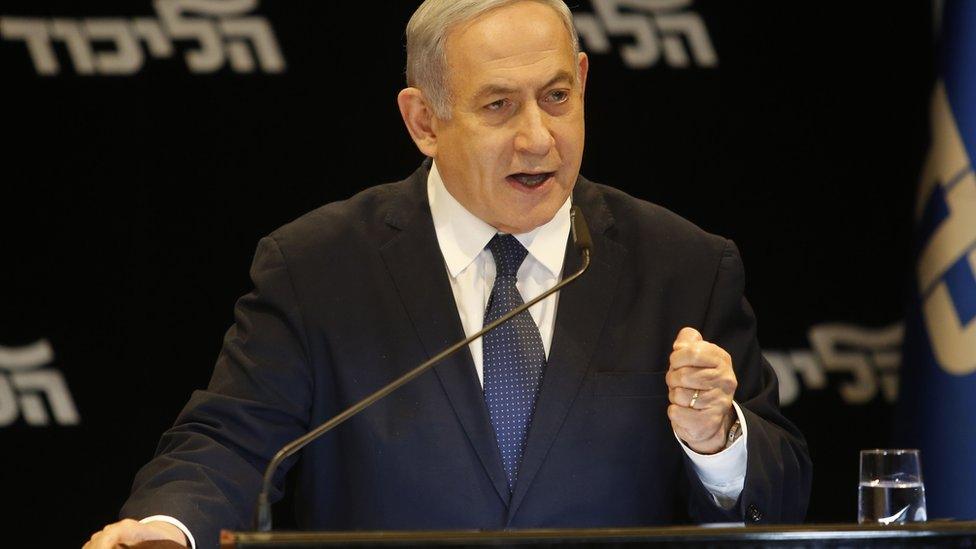Israel elections loom as lawmakers back bill to dissolve parliament
- Published

Benjamin Netanyahu (l) and Benny Gantz agreed to a power-sharing deal in April
Israel looks to be heading for its fourth election in less than two years after parliament backed a preliminary vote to dissolve itself.
The vote passed with support from the party of defence minister Benny Gantz, which entered into a power-sharing deal with PM Benjamin Netanyahu in April.
Party leaders have since been locked in political squabbling over the budget.
Wednesday's bill still requires further readings in parliament (the Knesset) before a new election is called.
In the vote, 61 lawmakers were in favour and 54 against.
In a televised speech on the eve of the vote, Mr Gantz blamed Mr Netanyahu for delays in agreeing a budget, which he called "an economic terror attack".
"Netanyahu didn't lie to me; he lied to you," he said. "He didn't dupe me; he duped the citizens of Israel."
In his own remarks, Mr Netanyahu said it was "not the time for elections - this is the time for unity".
Mr Netanyahu, leader of the right-wing Likud party, is currently on trial on corruption charges. He denies accusations of bribery, fraud and breach of trust.
What has led to Wednesday's vote?
Mr Gantz's centrist Blue and White Party - a key partner in the unity government with Likud - has accused Mr Netanyahu of deliberately delaying budget agreements as a way of holding on to power.
Under the terms of the power-sharing agreement, Mr Netanyahu serves as PM for 18 months and then hands over to Mr Gantz. But some analysts say he is looking to exploit a loophole that allows him to stay in office if the government collapses due to a budget impasse, the Times of Israel reports.
Israel is still operating on a version of the 2019 budget which was approved in 2018. Since then it has seen three indecisive elections.
The government's deadline to pass budget legislation is 23 December. However, Mr Netanyahu said last week that the process would not be completed before February - a delay Mr Gantz refuses to accept.
Normally, a vote to dissolve parliament proposed by the opposition would be easily voted down by the government.
But cracks began to appear earlier this week when Labour ministers - Mr Gantz's political allies in the government - said they would vote in favour of the bill. Blue and White then announced on Tuesday that it would also vote with the opposition.
After Wednesday's preliminary vote the bill will be sent to a Knesset committee for further discussion and preparation for second and third readings.
Only after the bill passes the third and final reading will the Knesset dissolve and fresh elections be called - probably some time between March and June.
In his remarks on Tuesday, Mr Gantz said Mr Netanyahu could still avoid the Knesset being dissolved if he acted quickly to pass the 2020-2021 budget as agreed to in the unity government deal.
"I will do all I can so that the country will have a budget and so that I can continue to serve it," he said.
What are the key issues?
The delayed 2021 budget includes key reforms aimed at helping the Israeli economy recover from the coronavirus pandemic.
Israel's central bank last week urged the government to approve next year's budget as soon as possible to avoid further fiscal restraint.
Ahead of the confidence vote, opposition leader Yair Lapid described the government as "bloated, corrupt... causing incredible damage to the Israeli economy".
"Infection rates are increasing again. We need a government that will work for the citizens of Israel," he said.
Coronavirus: Israel’s ultra-Orthodox lockdown challenge
In July, thousands of Israelis protested in Tel Aviv against the government's handling of the coronavirus crisis which they was causing widespread economic hardship.
Israel imposed its month-long second national lockdown on 18 September after recording infection and mortality rates that were among the highest in the world relative to population size.
In total, Israel has reported more than 337,000 Covid-19 infections and 2,867 deaths since the start of the pandemic.
- Published17 April 2020

- Published26 March 2020

- Published16 March 2020

- Published28 January 2020

- Published21 November 2024

- Published14 May 2020
